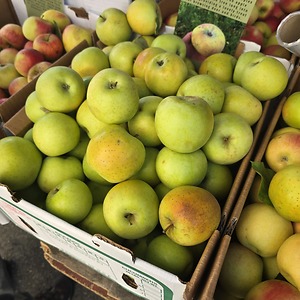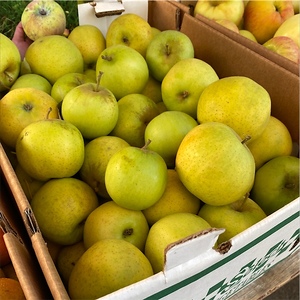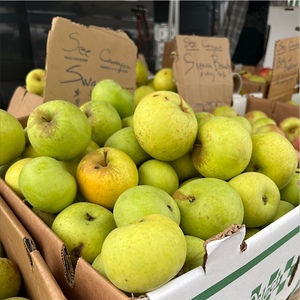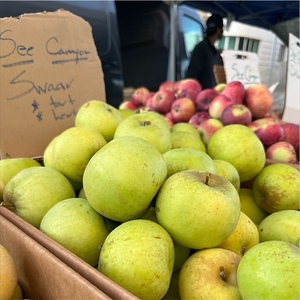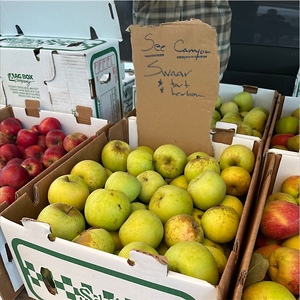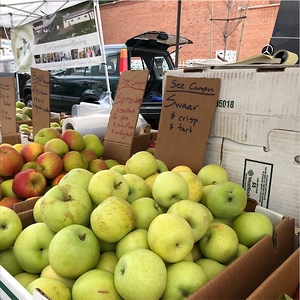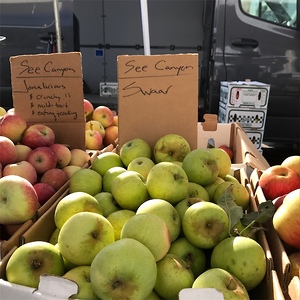


Swaar Apples
Estimated Inventory, lb : 0
Description/Taste
Swaar apples are a medium to large varietal, averaging 6 to 8 centimeters in diameter, and have a round, ovate, to conical shape with flat shoulders, a curved center, and a moderate-sized base. The apple’s stem is woody, dark brown, and fibrous, connected into a narrow cavity, and the fruit’s shoulders are often ribbed. The skin is semi-thick, tough, dull, and chewy, showcasing prominent russeted dark brown lenticels across the surface. The skin also bears patches of rough russet and has a yellow-green hue, becoming more yellow and greasy in storage. If the fruits are exposed to ample sunlight during cultivation, they may develop a faint copper-orange blush. Underneath the surface, the pale yellow to ivory flesh is dense, fine-grained, firm, and aqueous with a crisp consistency. The flesh also encases a moderately sized central core filled with dark brown, oval seeds. One of the distinct traits of Swaar apples is their texture change. As the fruits are stored, they become soft and tender, similar to the consistency of some pears. Swaar apples are aromatic and have a sugary, musty scent. The apples can be consumed raw or cooked and have high sugar mixed with acidity, creating a sweet-tart, vinous, and spicy flavoring. After a storage period, the flavors become complex, balanced, and mellow, with sweet, fruity notes and subtle nutty undertones.
Seasons/Availability
Swaar apples are harvested in the late fall through winter and can be stored through the spring.
Current Facts
Swaar apples, botanically classified as Malus domestica, are an American heirloom variety belonging to the Rosaceae family. The late-season apples were cultivated by Dutch settlers in New York State in the 19th century and were grown in home orchards for the apple’s complex flavoring and soft texture. Swaar apples remain on the trees for extended periods and are one of the last varieties to have fruit on the branches during the winter. The cultivar is also known as Hardwick apples, Der Schwere Appel, Autumn Swaar, and Sweet Swaar apples and is a specialty variety only grown by a few orchards. Swaar apples are not commercially cultivated and are a rare seasonal fruit enjoyed by apple enthusiasts in the northeastern United States. Historically, Swaar apples were mainly consumed fresh, and in the modern day, they are favored for fresh eating after being stored for a brief period to develop a sweet, complex taste.
Nutritional Value
Swaar apples have not been studied for their nutritional properties. Like other apple varieties, the heirloom cultivar may be a source of potassium to balance fluid levels within the body, antioxidants to protect the cells against free radical damage, and fiber to regulate the digestive tract. The variety also provides vitamin C to strengthen the immune system, vitamin K to assist in faster wound healing, vitamin A to maintain healthy organ functioning, and other nutrients, including zinc, copper, vitamin E, boron, calcium, manganese, and phosphorus.
Applications
Swaar apples have a sweet, nutty, and spice-filled flavor suited for fresh and cooked preparations. The dense apples are popularly consumed straight out of hand, and their taste will vary, depending on whether they have been stored or freshly picked. Most apple connoisseurs enjoy eating Swaar apples after they have been left in a period of storage. During this time, the fruit’s flavor mellows and sugar increases, creating a pleasant eating experience. Swaar apples can be sliced and served on cheese boards, tossed into salads, layered on sandwiches, or chopped and added to grain bowls. The apples also complement nut butter and are topped over toast or dipped into caramel as a sweet snack. Try blending Swaar apples into smoothies or fruit juices. In addition to fresh preparations, Swaar apples are baked into crumbles, muffins, cakes, bread, crisps, pies, and tarts. They can also be hollowed, stuffed with nuts, spices, and dried fruits, and wrapped in pastry as a decadent baked dessert. Beyond baked goods, Swaar apples can be simmered into jams, jellies, and sauces, or minced and mixed into stuffing for roasted meats. Swaar apples pair well with spices such as ginger, cinnamon, nutmeg, cloves, and allspice, herbs including cilantro, parsley, thyme, and rosemary, fruits such as grapes, melons, strawberries, and citrus, vanilla, chocolate, and maple syrup. Whole, unwashed Swaar apples will keep for 1 to 2 months when stored in a cool, dry, or dark location such as a cellar or refrigerator.
Ethnic/Cultural Info
Swaar apples were named by Dutch settlers who cultivated the variety in the Hudson River Valley of New York in the early 19th century. The name Swaar is the Dutch word for “heavy.” The apples earned their heavy moniker from their dense flesh and high juice content, giving them a weighty feel. Even before the Swaar apple’s discovery, the Hudson River Valley was known for its Dutch apple orchards. The Hudson River Valley has a unique microclimate catered to apple cultivation, and the Dutch were responsible for planting some of the first apple trees in the region around 1647. By the 18th and 19th centuries, orchards were planted throughout the valley, making apples one of the region's most popular fruits. In 1976, apples were also designated as New York State’s Official State Fruit. Throughout history, apples have remained a staple fruit in New York State, and the Hudson River Valley is a popular agrotourism destination in the present day.
Geography/History
Swaar apples are native to the United States and were first discovered in Esopus, New York, in 1804. The variety’s parentage is unknown, and some pomologists believe the apples are descendants of varieties planted by European settlers in the 17th century. Swaar apples were named by Dutch settlers in the Hudson River Valley and were a popular home garden cultivar in the 19th century. The variety was also commercially cultivated on a small scale, but newer, improved cultivars eventually overshadowed its presence. By the early 20th century, the variety was considered more of a novelty than a prominent cultivar. Today, Swaar apples are a rare heirloom variety grown through specialty orchards and home gardens in the northeastern United States. They are also grown by a few orchards in California. When in season, the apples are sold directly through growers and farmer’s markets.



